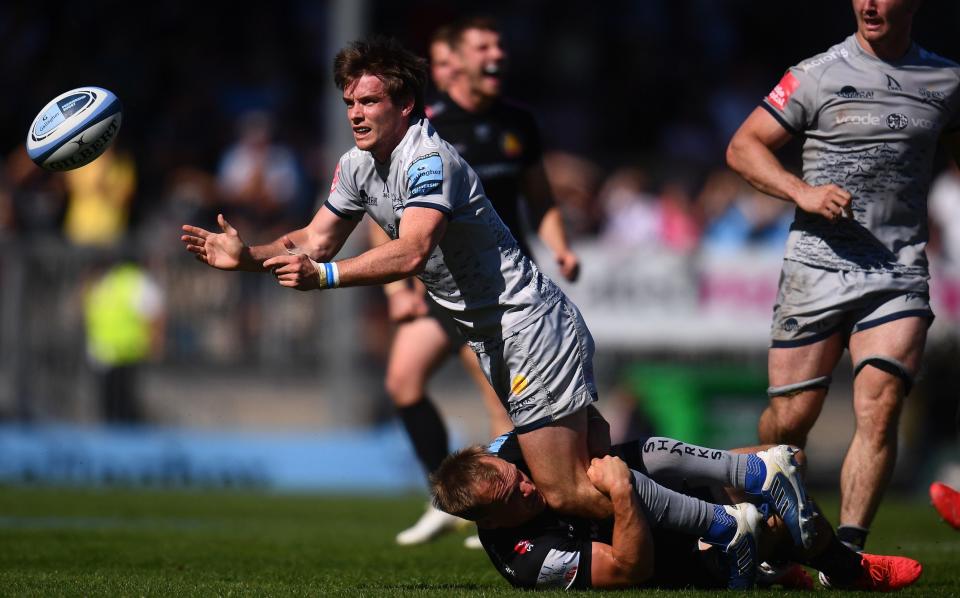Why fixture clashes and international call-ups mean Eddie Jones could decide the Premiership

A fortnight ago, to mark a week until the beginning of the Premiership Rugby season, BT Sport published a shiny social media graphic featuring one high-profile player from each of the competition’s 13 clubs.
The aim was to generate buzz for a new campaign. Maybe it did. However, only four poster boys – Worcester Warriors centre Ollie Lawrence, Newcastle Falcons wing Adam Radwan, Curtis Rona of London Irish and Leicester Tigers captain Ellis Genge – would feature over last weekend’s first round.

Injury-enforced absences are an inherent irritation of rugby union. Here, though, a crammed global calendar was the main culprit. Dan Biggar, Marcus Smith, Maro Itoje, Taulupe Faletau, Sam Simmonds and Louis Rees-Zammit are still resting after their British and Irish Lions exploits. Faf de Klerk is with South Africa at The Rugby Championship.
It was a small symbol of the commercial difficulties of fixture clashes, a marketing handicap that cannot enamour venture capitalists CVC. Everyone will have to cope with further disruption. At least twelve of the first 20 Premiership rounds will be affected by Test match call-ups. Two more clash with England training camps.
All the time, you hear coaches insist that they want their charges striving for international honours. In reality, as even Harlequins’ most ardent supporters would admit, some of Eddie Jones most controversial non-selections helped crown last season’s Premiership champions.
Of course, Joe Marler withdrew from England’s plans voluntarily. Neither Mike Brown nor Danny Care had won a cap since 2018. Perhaps Marcus Smith and Alex Dombrandt were not quite ready. We will never know. Regardless, the cumulative effect of all of these omissions was that Harlequins were able to retain a settled spine of in-form players.
Marler started 17 of 23 Premiership matches, 15 of those in the same front row as tighthead prop Wilco Louw. That continuity developed cohesion that manifested itself in the scrummaging destruction of Exeter Chiefs during the final at Twickenham. Arguably even more influential was how the Dombrandt-Care-Smith 8-9-10 axis could be deployed in 20 Premiership matches, according to Russ Petty’s research.
Harlequins are rightly proud of their less-is-more approach to contact training and how it has kept key performers on the pitch. Even so, it is no coincidence that their season gathered momentum between late January and mid-March with victories over Wasps, Bath, Leicester, Sale, Northampton Saints and Gloucester. As most rival clubs contributed more players to England’s Six Nations effort, Harlequins stuck together – with only Joe Marchant in the ‘shadow squad’ – and thrived. To paint Paul Gustard’s departure as the only factor in their up-turn is wrong.

By the same token, reaction to George Ford being left out of Jones’ most recent training squad has been markedly double-edged among the Leicester faithful. Most are bemused, especially on the heels of how the fly-half toyed with Exeter, yet many appreciate the boost the decision could deliver.
Should he spend the entirety of the 2021-22 season in the international wilderness, as unlikely as that feels, Ford will theoretically be available for Leicester’s league matches against Sale, Worcester, Gloucester, Saracens and London Irish as well as two each against Bath and Northampton. That makes nine Premiership fixtures he would otherwise miss.
Freddie Burns, whisked back from Japan to be Ford’s deputy at Welford Road, might be slightly peeved. But it is no exaggeration whatsoever to suggest that Jones will alter the course of the Premiership season as he ponders midfield combinations two years out from the next World Cup. Steve Borthwick has said there is a big gap between Tigers and the top four. Well, any chasm closes with Ford around – especially given Jack van Poortvliet and Richard Wigglesworth will cover Ben Youngs.
England’s impending revamp does accentuate the issue of fixture crossover. Saracens started the season as favourites with the bookies and their odds are bound to shorten if punters believe that Mark McCall is to field the Vunipola brothers, Jamie George and Elliot Daly regularly. Another quirk of this season, to off-set two more regular season Premiership matches, is bye weeks. Clubs competing in the European Challenge Cup, like Saracens, have one more weekend off than those in the Champions Cup.
Selection storylines of other nations figure prominently in this cosmopolitan competition, too. Let us stick with Leicester. They picked up Jasper Wiese when the belligerent back-rower was a rough diamond with slim Test prospects. One barnstorming season later, he is a Springbok – and unavailable to Tigers until round four at the earliest. Similarly, Leicester could have done with Marco van Staden not doing quite as well off the bench against the Lions. Their new recruit is currently bubbled with Wiese for The Rugby Championship.
Juarno Augustus, a former junior world player of the year, is one to watch at Northampton. He is in a shop window that Rassie Erasmus and Jacques Nienaber are monitoring. Saints director of rugby Chris Boyd will be monitoring the monitors. Harlequins could have headaches as well.
André Esterhuizen eluding Springboks selection is a bonus, but Jones has picked seven of their first-team squad – Marler, Dombrandt, Smith and Marchant as well as rookies Jack Kenningham, Louis Lynagh and Sam Riley – for next week’s England camp. Then you have the possibility of Tommaso Allan and Huw Jones playing their way back into contention for Italy and Scotland, respectively.
Up at Sale, Alex Sanderson is spinning plates. On October 3, his team hosts Exeter in a rematch of June’s semi-final. Lions openside flanker Tom Curry will not yet be ready. De Klerk, Lood de Jager and the Du Preez twins, Dan and Jean-Luc, will be with South Africa. Fly-half AJ MacGinty has the USA’s World Cup qualifier against Uruguay in Colorado.

“This is part of me wearing two hats,” Sanderson admitted last week. “I want what’s best for them, because I buzz off that and get a real sense of pride when they put on an international shirt. But I also want what’s right for the club.
“If they do go away, I can’t control that event, so what’s my reaction to it? Frustration? Disappointment for the team? That doesn’t solve the issue. You’ve just got to get on with it and back the lads that are here.
“It’s quite obvious with the South Africans coming back, because if they are in form then they’re starting. The lads I’ve got here right now have just spent six weeks training the house down. We are going to rotate, so a lot of them will get opportunities. But they want to play now.
“I’m trying to create an awareness that it’s not who starts the season, it’s who finishes it and who’s in those games towards the back-end. That’s the biggest challenge – keeping the healthy competition we’ve built over pre-season while individuals have little bumps in terms of their non-selection.”
The Premiership salary cap has tightened from £6.4m to £5m for this season and analysis from Esportif Intelligence reveals that squad numbers have generally dipped slightly since 2019. This would surely make losing top earners, for whatever reason, more damaging for clubs. At the very least, factors such as a flourishing academy production line and a strong tactical identity have to be more important.
Sanderson’s experiences at Saracens will have taught him how to power through and peak at the climax of a Premiership campaign after the complications of international call-ups have subsided. Some may contend that crossover periods have become an accepted part of the Premiership’s fabric and that the play-offs offer innate mitigation for the regular season’s slings and arrows. That will be no consolation to the club that finishes fifth.
The praise that the Premiership receives for its competitive and unpredictable nature feels artificial when the fixture schedule, and whether you face certain opponents while they are fully-loaded, seems so significant. What irks fans is how this compromises the integrity of the competition. ‘But it has been this way for ages,’ is hardly a convincing retort.
Clarity over resting protocols is not easy to come by either. Guidelines are different for members of England’s senior Elite Player Squad, which is no longer published. Sam Simmonds can return before Exeter colleagues Luke Cowan-Dickie and Jonny Hill, for instance. Harlequins had to seek special dispensation from the Professional Game Board for Smith, a late Lions inclusion, to begin playing earlier.

Fewer matches is one solution for the Premiership to avoid as many clashes with Tests, not that clubs would countenance a revenue drop. The United Rugby Championship (URC) is more streamlined. Teams have 18 regular season games in a regional conference structure, as opposed to 24 for Premiership clubs. No URC rounds clash with autumn Tests and only two will be staged during the Six Nations. One Premiership weekend will be affected by autumn Tests, with six during the Six Nations. Then you have two England training camps in rounds seven and 14 as well.
Every one of Jones’ selections is pored over, but the scrutiny this year should be more intense than ever. In a perfect storm of Lions aftermath, England overhaul and careful spending from clubs, his decisions will shape the Premiership season.

 Yahoo Sport
Yahoo Sport 





































